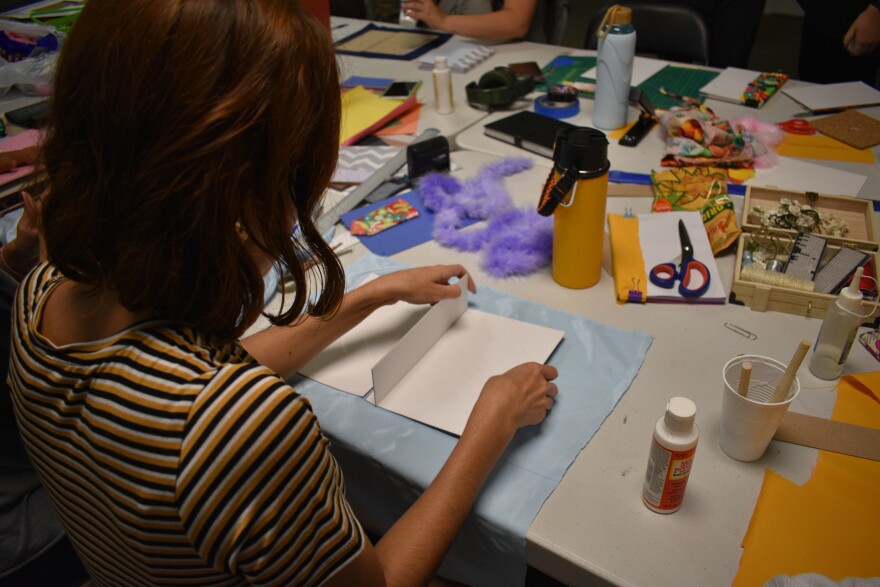WLRN interns spent some time this summer looking at how the idea of gender is changing in South Florida. This story is part of their project.
At a journal-making workshop in early August, a group of 20 people gathered around tables at the Miami Workers Center in Liberty City. They talked loudly while folding paper, cutting fabric and gluing cardboard together to create a hardcover journal from scratch.
Kaylee Nieves sat near the front. Nieves, who wore mismatched hoops and patterned overalls that exposed a handful of tattoos, is gender non-conforming. It’s a term used to describe people who don’t identify with traditional expectations of male or female genders.
“My pronouns are she.. They.. he.. Really.. Everything and nothing,” Nieves says.
Nieves is part of a growing number of people who identify as non-binary. Similar to gender non-conforming, the term describes a gender identity outside of the two traditionally-used categories. Many non-binary adopt different pronouns, using they/them instead of he/his or her/hers.
For Nieves, using “they” is comforting. It’s who they are.
“There are so many different parts of myself that can relate to the different sides of gender. But also, being they is like taking apart what gender is,” Nieves says.

Nieves is a new member of (F)empower, an all-female artists collective in Miami trying to elevate what the founder calls "female energy." It open to people like Nieves, or anyone else who identifies with being femme, regardless of their sexual orientation or gender identity.
The collective got started on paper—as a zine created by founder Helen Peña in 2017. It envisioned a post-apocalyptic future run by an all-black girl gang that “fought together, learned together” and “loved each other.”
Now, the girl gang Peña envisioned has made its way into real life and it's thousands-strong; the collective has almost 5,000 followers on Instagram and has been featured on websites like Remezcla, a media brand for Latino millennials.
(F)empower hosts art shows, book clubs, dance parties and workshops. Recently, they hosted an eight-week DJ class for women to encourage them to join a male-dominated industry.

At the journal-making workshop in early August, members gathered to make books for the Liberation Book Club, a club that meets every Thursday and covers topics like black queer love and prison abolition.
Nicole Combreu, a (F)empower member and Miami-native, led the workshop. She says that keeping a journal gives individuals a sense of agency, and an ability to create a safe space for themselves.
“Generally, people don’t always have [that],” Combreu says. “Now that we actually have the opportunity to bring a community together, one of the things we’re using to strengthen that community is identity.”
For Nieves, the crux of their identity is it's fluidity. Sometimes, they feel more masculine—wearing baggy clothes and no makeup. On these days, Nieves says, they don’t have to put so much energy out into the world to feel respect when they walk outside.
“When I feel more like a boy that day, I feel like I don’t have to walk as tall,” Nieves says.
Other days, Nieves feels differently. They dress and carry themselves accordingly.
“The point of being gender non-conforming,” Nieves says, “Is that I can be everything.”

Celebrating unique identities is an essential part of (F)empower’s mission.
“It’s really the intersectionality that counts,” Peña says. “A lot of the girls involved in (F)empower, [this is] how they are. They don’t act according to what the gender binary tells them but more so according to whatever they feel is their truth.”
Each time a member finished their journal, the entire group cheered.
Nieves plans to continue to take part in (F)empower.
They faced the room, full up people packing up art supplies and showing each other their journals.
“You don’t have to fully understand someone but you can accept them,” Nieves says. “No one’s ever gonna fully understand you, but people can still love you and still say, like, this is who you are and I still wanna be a part of that.”






